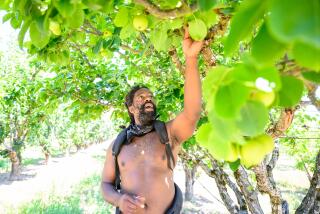Review: ‘The Good Food Revolution’ details a black farmer’s journey
Like his mother and like his daughter, Will Allen meant to escape the life of a farmer, only to learn he never really could — nor did he really want to.
The son of a sharecropper, the 60-year-old Allen has become an icon of the urban agriculture movement. He runs a farm and education center in Milwaukee called Growing Power that produces food and soil for thousands, tries innovations in composting and growing, employs more than 100 people, trains many others and aims to help transform the food system.
In one way, it began in 1993, when Allen opened a farm stand not far from Milwaukee’s largest public housing project. In another, it began decades earlier. Allen tells both stories in his new book, “The Good Food Revolution.”
His book could have been another look at the problems of the industrial food system, the lack of healthful food in many poor communities and ideas to reverse course. And it is that, but it’s also told through the painful but important lens of the African American experience.
Allen gives readers the personal, moving account of a man whose family became part of the last century’s great migration of African Americans out of the South. Of a man who traded a successful — and not too difficult — life in the corporate world for the economic uncertainties and the nonstop labor of a small farmer.
“The Good Food Revolution” is inspiring not only because of Allen’s own story but because of those of the people around him — his parents and siblings, wife and children. There’s DeShawn Parker, the son of one of Allen’s early employees who was critically burned in a fire as a toddler. He struggled for years with his identity and the path of his life, finally deciding to become a chef. In a couple of weeks, Allen has said in a recent interview, the Growing Power store and cafe is expected to open on the ground floor of a low-income housing development — with Parker as chef.
Allen’s mother, Willie May Kenner, and her husband worked as sharecroppers in South Carolina — “tenant farmers who gave up half of the crop they planted and harvested each season in exchange for the right to pick it,” taking home pitifully small sums, he writes.
But in South Carolina, Willie May knew how to feed her family: how to grow fruits and vegetables, how to preserve them, how to use every bit of a slaughtered hog. “She was leaving for a city where it was uncertain if any of the skills she had — or any of the dreams she harbored — would matter,” he writes.
“In that transition, we lost the agricultural skills that had once been our birthright”; black farmers cultivate 0.004% of the country’s farmland, he says. “The question is whether this should be called progress.”
In Allen’s own family in the 1950s, his father grew food at their home near Washington, D.C., and Allen and his brothers were expected to help raise and sell it. But once Allen found basketball, “I wanted nothing else in life.” It was his ticket out. A standout in high school who grew to 6-foot-7, Allen went to the University of Miami.
“I was defining myself on my own terms,” he explains. “My future would not be living in a wooden house on someone else’s property, growing food. I had made myself into something. I thought I would never have to farm again.”
But it turns out that basketball also led to his “homecoming” to the land. After college and a brief basketball career in the U.S., Allen and his wife moved to Belgium to play there, and one day he helped a teammate whose family farmed.
“Touching the soil — a hidden passion came out,” Allen has said in an interview. A seed was planted in his mind, and in his heart. Back in this country, Allen grew more and more food as he held corporate jobs for Kentucky Fried Chicken and Procter & Gamble. Eventually, he bought the last remaining farm in Milwaukee — a huge financial gamble.
Allen understands the feelings of farm children who want out, who see their families struggle to make a living and are never able leave the farm for vacations. And the work can be brutal. His daughter Erika used to complain that she worked so hard on Allen’s farm that it seemed like training for the Olympics. But after college and her own career, she began to see the role fresh food plays in building communities and eventually decided to work with Growing Power.
Growing Power has attracted the attention of government officials all the way to the White House; Allen has been honored with a MacArthur “genius” grant, and his work has been featured in books and films. It all, he says, comes down to the soil. It’s a topic he returns to repeatedly in the book.
“Children often come into my facility for the first time with their pockets filled with candy, acting wild. Something changes in them when they … put their hands in the soil for the first time. They mellow. It can be a spiritual thing simply to touch the earth if you have been disconnected from it for so long,” he writes.
Every city, he believes, needs a large composting operation to create clean nutrient-rich soil that can change the urban landscape when it’s spread to create land for growing food.
“I don’t look for a lush area,” Allen said. “If I see a 12-acre parking lot that hasn’t been used in years — I say, ‘Oh, that’s a farm.’ ”
More to Read
The biggest entertainment stories
Get our big stories about Hollywood, film, television, music, arts, culture and more right in your inbox as soon as they publish.
You may occasionally receive promotional content from the Los Angeles Times.







